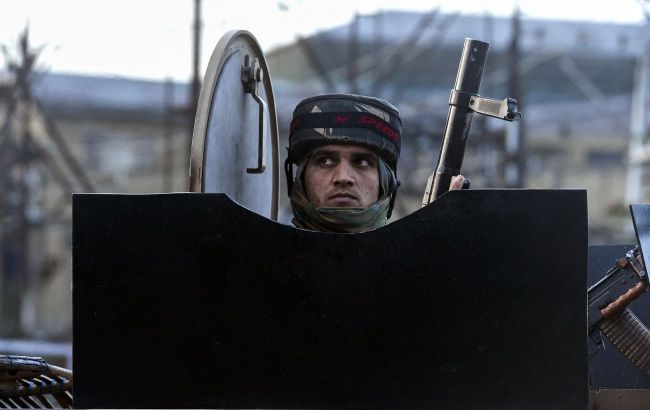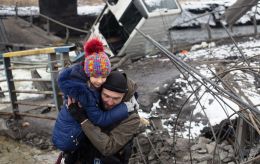On brink of war? What's happening between India and Pakistan now
 Photo: The situation between India and Pakistan is rapidly escalating (Getty Images)
Photo: The situation between India and Pakistan is rapidly escalating (Getty Images)
The conflict between India and Pakistan continues to escalate rapidly following the attack on tourists in Kashmir. New Delhi has given its army "full freedom" in making decisions, while Islamabad says it has intelligence indicating India is preparing for a military operation in the coming hours.
RBC-Ukraine has gathered the latest on what is happening between India and Pakistan in the article below.
Takeaways:
- What happened after the attack on tourists in Kashmir?
- Why did India accuse Pakistan of terrorism?
- Who claimed responsibility for the attack in Pahalgam?
- Why did India give its army "full freedom of action"?
- Is Pakistan preparing for an Indian attack?
- Are the US concerned about the situation between India and Pakistan?
Cause of escalation between India and Pakistan
Tensions between the two nuclear powers escalated after armed militants opened fire on tourists in the village of Pahalgam in India's Himalayan region on Tuesday, April 22, killing over two dozen people.
Responsibility for this brutal attack was claimed by the little-known militant group Kashmir Resistance. On social media, the group expressed dissatisfaction with the settlement of over 85,000 "outsiders" in the region, which they believe has led to "demographic changes."
Indian law enforcement officials say the armed individuals responsible for the attack are members of the Pakistan-based group Lashkar-e-Taiba, recognized by the UN as a terrorist organization. Police published the names of three suspected militants and claimed that two of them are Pakistani citizens.
The day after the attack, India accused Pakistan of supporting terrorists and took several measures. In particular, New Delhi suspended a 60-year-old water-sharing treaty, announced the closure of its main land border crossing with Pakistan, downgraded diplomatic relations, and canceled visas for Pakistanis. According to media reports, India may also close its airspace to Pakistan.
In response, Pakistan, denying any involvement in the attack, warned that a blockade would be viewed as an "act of war" and responded with its own countermeasures.
Islamabad suspended visas for certain Indian citizens and expelled some Indian diplomats and defense officials. In addition, the Pakistani Senate unanimously adopted a resolution "against linking the Pahalgam attack to Pakistan."
Border shooting
The gunfire has also happened between Indian and Pakistani forces. The first exchange of fire along the Line of Control in Jammu and Kashmir took place on the night of April 25, following the escalation. According to the Indian side, the firefight was initiated by Pakistan.
While clashes between the sides continue, one of India's largest news agencies, Press Trust of India, reported that the authorities demolished the homes of members of the Lashkar-e-Taiba group believed to be involved in the Kashmir attack.
The homes of at least 10 suspected participants in the attack were demolished by Indian authorities. However, Indian officials have not officially linked such actions across various areas of the Kashmir Valley to the attack in Pahalgam.
In addition, social media reports claim that both countries have allegedly moved troops closer to their borders.
Indian Prime Minister gives army 'full freedom of action'
Indian Prime Minister Narendra Modi made a firm statement on April 24, vowing to find and punish those responsible and their supporters. This commitment was backed at a special cabinet meeting convened by the Prime Minister on the same day, where officials expressed unanimous support for decisive retaliatory actions.
"We will pursue them even to the ends of the Earth," declared India's Prime Minister.
As The Times of India reported, Modi has already given the military "full operational freedom to decide on the methods, targets, and timing of India's response to Pakistan for the Kashmir terror attack."
"The armed forces have full operational freedom in choosing the method, targets, and timing of India's actions in response. Our national resolve is to deliver a crushing blow to terrorism," Modi said.
Pakistan expects Indian strike within next day
Pakistani Defense Minister Khawaja Asif told Sky News that recent developments could lead to a "total war" between Pakistan and India.
Asif emphasized that the world should be "concerned" about the possibility of a full-scale conflict between nuclear-armed nations. The minister also expressed hope that the dispute could be resolved through negotiations.
Asif said Pakistan is on heightened military alert but will only use nuclear weapons if there is "a direct threat to its existence."
A few days ago, the Pakistani Defense Minister also stated that following the recent attack on tourists in Kashmir, an Indian military invasion had become "almost inevitable." He initially predicted a war "within the next two to four days" but later clarified that he was misunderstood.
However, Pakistani Minister for Information Attaullah Tarar still believes that India intends to attack his country within the next 24–36 hours. Tarar warned that in such a case, New Delhi would bear "full responsibility" for potentially catastrophic consequences in the region.
"Pakistan has credible intelligence that India intends to take military action within the next 24-36 hours, using the Pahalgam incident as a pretext. Any aggression will be met with a resolute response," Tarar wrote on April 30 at midnight on his social media page X.
US urges 'no escalation.' Rubio to hold talks with India and Pakistan
The United States has urged both countries not to escalate the conflict. US State Department Spokesperson Tammy Bruce announced that Secretary of State Marco Rubio is preparing to hold talks with the foreign ministers of India and Pakistan. Communication is expected "today or tomorrow," she said.
According to a US foreign affairs representative, Rubio is also encouraging other national leaders and foreign ministers to engage with other countries on this issue.
Bruce assured that the United States is monitoring developments in the region and maintaining communication with the governments of India and Pakistan "not only at the foreign minister level but at many levels."
"Of course, we encourage all parties to work together toward a responsible resolution. The world is watching," the US State Department Spokesperson added.
The Kashmir region has long been a point of contention between India and Pakistan and to a lesser extent between India and China.
New Delhi and Islamabad both claim Kashmir as their own, though it is divided between them. The conflict began in 1947 after both countries gained independence.
Since then, India and Pakistan have fought three wars, two of which were directly related to Kashmir. New Delhi considers the region an integral part of its state, while Islamabad insists that the Muslim population of the region has the right to self-determination or to join Pakistan.
To find out more about what's happening between India and Pakistan and how the Kashmir region is involved, read our material on the topic.
Sources: publications by Press Trust of India, The Times of India, Sky News, News18, and statements from government representatives of both countries.

